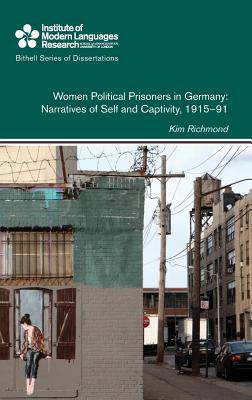
- Afhalen na 1 uur in een winkel met voorraad
- Gratis thuislevering in België vanaf € 30
- Ruim aanbod met 7 miljoen producten
- Afhalen na 1 uur in een winkel met voorraad
- Gratis thuislevering in België vanaf € 30
- Ruim aanbod met 7 miljoen producten
Zoeken
Women Political Prisoners in Germany: Narratives of Self and Captivity, 1915-91
Volume 43
Kim Richmond
€ 27,95
+ 55 punten
Omschrijving
One of the few major enquiries into women's narratives of political incarceration, this volume examines first-person accounts written against a backdrop of momentous historical events in twentieth-century Germany. Rosa Luxemburg's prison letters are the starting point for the study, which explores the ways in which writing is used as a response to incarceration: how does the writer 'perform' femininity within the de-feminizing context of prison? How does she negotiate a self-representation as a 'good' woman? Central to this investigation is an awareness of the role of language as a means of empowerment within the disempowering environment of prison. As a key female political figure in twentieth-century Germany, Luxemburg wrote letters from prison that encapsulate prevalent notions about womanhood, prison, and political engagement that are perceptible in the subsequent texts of the study. The diaries of Luise Rinser and Lore Wolf from National Socialist prisons show, in different ways, how the writer uses language to 'survive' prison, whilst Margret Bechler's and Elisabeth Graul's retrospective accounts of GDR incarceration give insight into the elastic concept of both the political prisoner and the 'good' woman. All narratives provide examples of the role of language in resisting an imposed identity as 'prisoner', 'criminal', and object of the prison system. Kim Richmond completed her PhD at the University of Edinburgh and is now an Associate Lecturer in Languages at the Open University.
Specificaties
Betrokkenen
- Auteur(s):
- Uitgeverij:
Inhoud
- Aantal bladzijden:
- 200
- Taal:
- Engels
- Reeks:
Eigenschappen
- Productcode (EAN):
- 9780854572472
- Verschijningsdatum:
- 19/02/2016
- Uitvoering:
- Hardcover
- Formaat:
- Genaaid
- Afmetingen:
- 156 mm x 234 mm
- Gewicht:
- 458 g

Alleen bij Standaard Boekhandel
+ 55 punten op je klantenkaart van Standaard Boekhandel
Beoordelingen
We publiceren alleen reviews die voldoen aan de voorwaarden voor reviews. Bekijk onze voorwaarden voor reviews.











